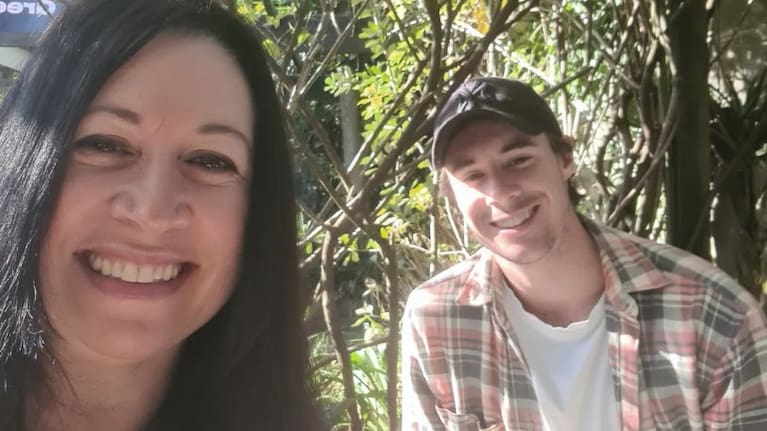This story discusses suicide.
A woman whose adult son was discharged from a mental health unit into an Auckland boarding house says the living conditions were appalling and unfit for such a vulnerable person.
Tragically, he died in a suspected suicide after moving in with her.
Lisa Hawkeswood said her son Jack lasted three days in the lodge before pleading to live with her because he hated his accommodation.
"He was discharged alone," she said. "Within 72 hours of discharge, he felt like he was having a breakdown and he didn't feel safe, he didn't feel safe living there."
Her son had addiction and mental health challenges and his relationships had fractured by the time he was admitted to Auckland's acute mental health unit, in November 2023.
Jack was there for three weeks before being discharged to a boarding house.
She said he had called her and left a message in distress, then called an ambulance to be taken back to hospital.
The morning's headlines in 90 seconds, including a dramatic late night rescue in a posh Auckland suburb, the White House says Elon Musk’s pet project doesn’t exist, and what Britain’s PM thinks former prince Andrew should do now. (Source: Breakfast)
"He said 'can you help me out and get me out of here, they've put me into this kind of motel unit, there's blood on the carpet and there's gang members trying to make me do meth'."
Hawkeswood said he came to live with her and she was devastated when he tragically died three weeks later.
She said she later visited the boarding house he had been discharged to and the manager told her they also housed people released from prison.
"I know this is a problem, safe housing for people after discharge."
A boarding house manager not linked to the case said he is regularly asked to take people who have been discharged from mental health care.
Fred Ofa owns Charlton Property Management which runs eight boarding houses in Auckland - he said they have about 20 people who are mental health patients, referred to them by support agencies.
"We're housing them in facilities that are sanitary, facilities that are safe, in facilities that you or I would live in. That brings some normality to their life as well.
"They're getting care or wraparound service that's different from your normal joe blogs. This type of care where you've got nurses that are coming on site and making sure that they're taking their medication, that's not normal and there's support to take them to programmes. There's some normality throughout their day."

Fred Ofa says he only takes on people from mental health units if they have wrap-around support.
"The worst thing operators like myself and people who supply this type of accommodation is to take anyone and everyone because we're not trained to look after these people we're there to supply houses.
"I've seen where they've put anyone and everyone into housing and it doesn't work."
He says having a support person as a point of contact for tenants receiving mental health care in the community is crucial.
"We had a recent case where the support person left their details with us and as soon as something happened we were able to contact them. The situation was quite severe, he tried to burn down one side of the house. The fact that we said hey look you can't do that again, we're going to get you support [after] he slipped up, he didn't take his medication that day."
Health NZ's director of specialist mental health and addiction, Karla Bergquist, said their practice is not to discharge people to homelessness.
"Many people who are admitted to mental health inpatient care are discharged home to their previous accommodation," she said.
"If this is not possible, clinical services work closely with housing and social service partners to ensure people leaving mental health inpatient care have safe and appropriate accommodation.
But she said there are not any reliable figures on where people are sent to.
Bergquist said a programme to help homeless people move from inpatient care to stable housing with wrap around support began in 2021 in Auckland and Waikato, called Rapua Te Āhuru Mōwai.
Since then more than 90 people in Auckland have been discharged into accommodation that is not a boarding house.
The programme, delivered in partnership with the Ministry of Housing and Urban Development, houses people in self-contained units or apartments in low or medium density blocks across the Auckland region.
It followed a 2020 report released by the Chief Ombudsman that raised concerns about two Auckland mental health units in which people were staying longer than clinically needed because they had nowhere to live.
At the time, a lack of suitable accommodation meant that 13 people were staying longer than they needed in Auckland City Hospital's Te Whetu Tāwera Acute Mental Health Unit, one for up to 17 months.
The Chief Ombudsman found another five people had been in Waitākere Hospital's Waiatarau Mental Health Inpatient Unit for over six months, for the same reason.
Lisa Hawkeswood said when her son was discharged to a boarding house and then lived with her, there was no safety plan for his care - something she has questioned and RNZ understands is part of an ongoing coronial inquiry.
"It was on the last day, on the 11th of December, that the key worker said to me you do know that he shouldn't be left home alone, which I was confused about because no one had ever told me that."
Hawkeswood is still grieving for Jack whom she said was outgoing, kind, creative and intelligent and keen to get into acting.
She finds solace in songwriting and has set up a Waikato trust to help others struggling with mental health and addiction, access information and services.




















SHARE ME